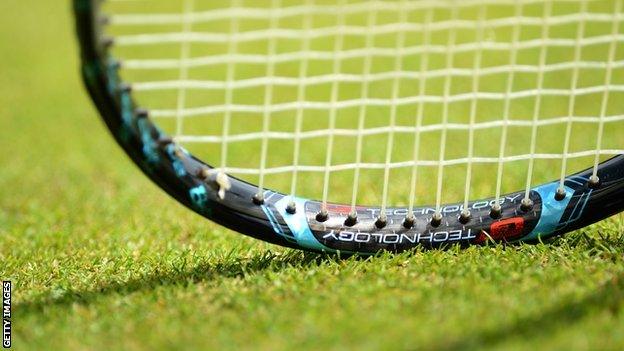Tennis to implement Athlete Biological Passport programme
- Published

Tennis will implement an Athlete Biological Passport programme to support the fight against drug cheats.
The programme will collect and compare biological data and spot discrepancies over time that suggest possible doping.
The International Tennis Federation (ITF) currently tests blood and urine.
"We feel that this is the most effective way to show the world that tennis is a clean sport," said Brad Drewett, executive chairman and president of the ATP.
As with the current drug testing rules, the biological passports will not be compulsory but any athlete who refuses to take part in testing could face punishment.
The decision to introduce biological passports comes after the Tennis Anti-Doping Programme Working Group - comprised of representatives from the ITF, ATP, WTA governing bodies and Grand Slam tournaments - gave its backing.
The programme will see more blood tests conducted, particularly out of competition.
"The implementation of the Athlete Biological Passport is an important step in the evolution of the Tennis Anti-Doping Programme as it provides us with a great tool in the fight against doping in our sport," said ITF President Francesco Ricci Bitti.
"We also hope to have increased support from the National Anti-Doping Agencies around the world who need to do their part if we are to win this battle and make our programme more effective.
Questions have been raised by some of the sport's top players in recent months about the drug-testing programme.
Newly released data for 2012, external reveals there were 2,185 tests carried out - up slightly from 2,150 in 2011). The vast majority examined urine samples - last year there were 124 in-competition blood tests (110 in 2011) and 63 out of competition (21 in 2011).
World number one Novak Djokovic recently described how the number of blood tests he undergoes has declined.
He said: "I wasn't tested with blood for last six, seven months. It was more regularly in last two, three years ago. I don't know the reason why they stopped it."
Roger Federer and Andy Murray also called, external for more testing, with the Swiss claiming he was being tested less than before.
"I feel I'm being less tested now than [I was] six, seven, eight years ago," said Federer.
"I don't know the reasons [why] we are being tested less and I agree with Andy, we don't do a lot of blood testing during the year. I'm OK having more of that."
- Published22 January 2013
- Published4 February 2013
- Published4 November 2012
- Published18 January 2013
- Published19 January 2013
- Published19 January 2013
- Published19 January 2013
- Published19 January 2013
- Published18 January 2013